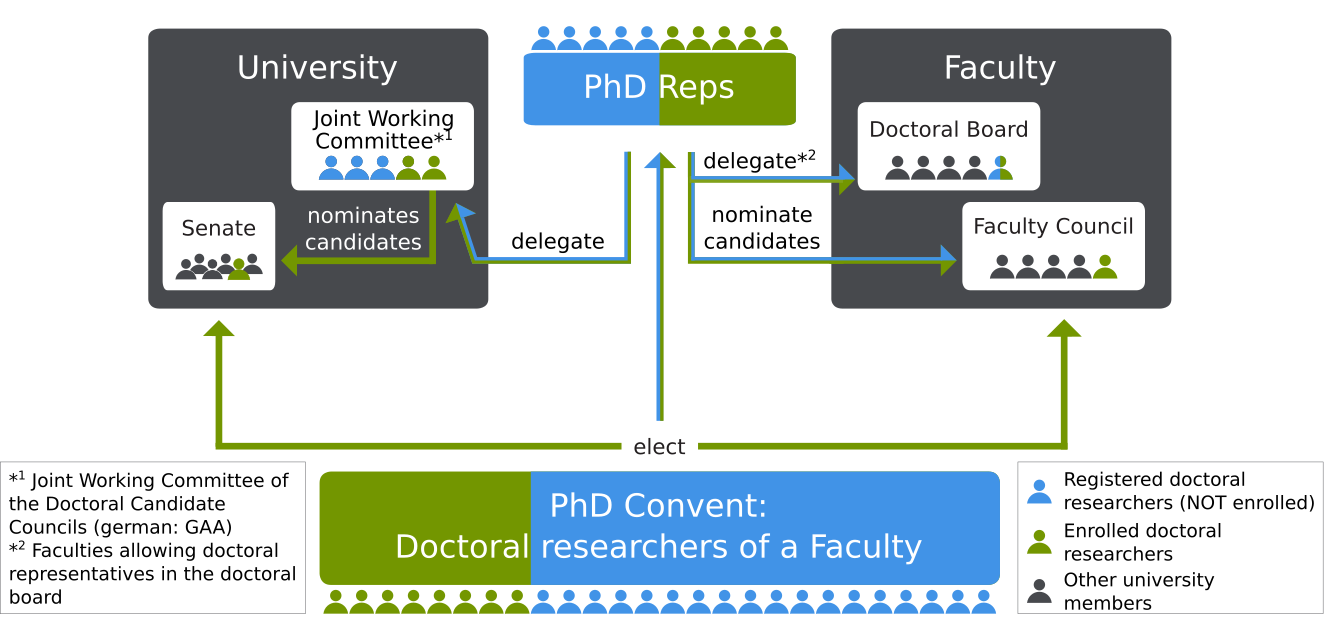What is the PhD Convent?
All PhD candidates who are registered at
the Faculty of Biology form our PhD Convent.
We are your official representation!
The PhD Convent for Biology was established in 2016. For an overview what we achieved since then, have a look at our yearly reports, e.g. the one from 2018 or 2019.
Currently, the main focus of our work is the political representation of the Biology PhD candidates' interests in different committees. There are further goals we pursue, generally related to the well-being and networking of PhD students of our faculty. In the future, we would like to establish events to bring the PhD candidates of our faculty more closely together.
We meet twice a month to discuss the important topics which came up in different committees or how to improve the life and work of the PhD candidates. We are always happy for any input or help from your side. If you would like to be part of the PhD Convent representation, please don't hesitate to contact us!
See below for a detailed look into the different committees where we represent the Biology PhD candidates. Links to the regulations underlying these structures are collected here. A short explanation to all committees is given in the glossary.

All PhD candidates of a Faculty form the PhD Convent. At yearly meetings, all PhD candidates from the Faculty are invited to elect their PhD representatives.
Enrolled and registered doctoral candidates
There are differences between registered and enrolled/matriculated doctoral researchers (highlighted by the different colors in the scheme). Both groups belong to the PhD convent and can take part in all committees. The exception: formal decision-making (voting) university bodies (Faculty Council for the faculties and the Senate for the whole university) require the elected representative to be enrolled. However, many issues are thoroughly discussed and a consensus is reached in the subcommittes, e.g. the Doctoral Board, before presentation to voting bodies.
Doctoral Board
The Doctoral Board is a committee in which rules and regulations specific for PhD candidates of the Faculty of Biology are discussed and decided on. Its members are 12 professors of the Faculty of Biology. We have guest status here, i.e. we can actively bring in proposals and influence discussions. However, we do not have a vote, (yet!).
Faculty Council
The highest committee of the faculty is the Faculty Council. Its members are representatives of the different groups (professors, academic staff, administrative staff, students and enrolled PhD candidates). You elect your one representative once a year as part of the general university elections. The Faculty Council is in charge of all important decisions which have to be made on Faculty level.
Being part of the Faculty Committee is a great opportunity, as one can influence this decisions and stays up-to-date with everything important going on in the faculty.
Joint Working Committee (GAA)
On a university-wide level, PhD representatives of all faculties work together in the "Joint Working Committee of the Doctoral Candidate Councils", in German: "Gemeinsamer Arbeitsausschuss der Doktorandinnen- und Doktorandenkonvente". Since this is an incredibly long word, we call it "GAA". The GAA meets once a month and discusses topics that apply to all PhD candidates of the whole university. It also represents the link to members of the rectorate, the International Graduate Academy (IGA) or the Senate. The GAA is also the committee deciding on how to spend the money (7€ per enrolled student, "Beitrag für die Verfasste Studierendenschaft") you pay each semester in case you are enrolled.
Senate
Finally, there is the Senate. The Senate is one of the highest committees of the university and the highest committee in which we are represented. Like the Faculty Council, it consists of representatives of all groups of the univerity. The Senate meets once a month and decides on the majority of what happens at the university. Being it the final decision on the appointment of new professors, how the university should develop in the next few years, and generally all regulations which were prepared in hierarchically lower committees. Also for the Senate, you can elect your three representatives once a year as part of the general university-elections.
The Senate has many subcommittees which work on different topics. Those subcommitees usually do the actual work on the topic and the Senate only has to approve their work. Often, you do not have to be elected into the Senate to be able to work in one of its subcommittees. This means that we can actively join decision-making processes and bring attention to the needs of the PhD convent.
Should this have kindled your interest and you would like to know more: We would be happy to welcome you at one of our meetings :) The more, the merrier and the more participants, the more good we can do for the PhD students of our Faculty.

